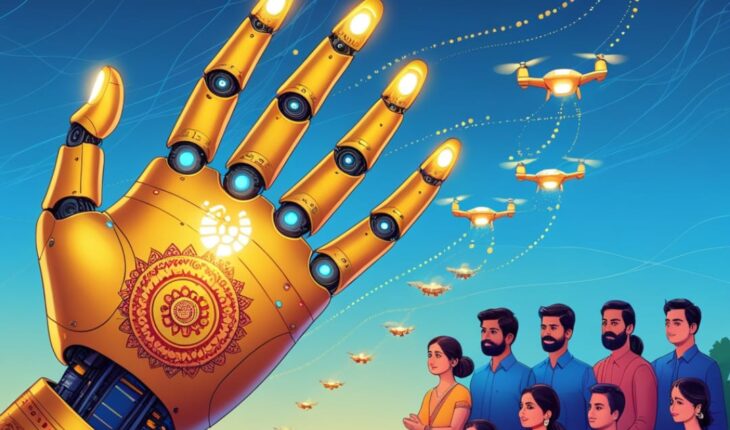AI promises a brighter future for ordinary Indians. In the next five years, it will transition from a futuristic concept to an integral part of everyday life in India.

Artificial Intelligence (AI) is rapidly transforming the global landscape, and India is no exception. Over the next five years, AI is poised to influence almost every facet of life for ordinary Indians, revolutionizing sectors such as education, employment, finance, health, communication, and mobility. This technological evolution promises to bridge gaps, create opportunities, and redefine how people interact with the world.
Affordable Healthcare: AI will bridge the gap between India’s growing healthcare demands and limited resources. Telemedicine powered by AI will enable remote consultations, offering medical advice to patients in the country’s remotest corners. AI-driven diagnostic tools will provide accurate results in record time, reducing dependency on specialized labs. Predictive analytics will play a crucial role in preventive healthcare, identifying risks based on patient data and enabling early interventions. AI-powered wearables will monitor vital signs in real-time, empowering individuals to take charge of their health.
Revolutionizing Finance: Advanced AI algorithms will enhance fraud detection, reducing financial crimes. Chatbots and virtual assistants will streamline customer service, enabling faster resolution of queries. Personalized financial planning tools will help individuals manage their money better, and AI-driven investment platforms will make wealth-building strategies available to the average Indian, democratizing financial growth.
Super Communication: AI will revolutionize communication, especially across linguistic and geographical divides. AI-based real-time translation tools will allow seamless conversations in multiple regional languages, fostering greater collaboration and unity in a diverse nation. Advancements in Natural Language Processing will make digital interactions more intuitive, enabling even those unfamiliar with technology to use it effectively. Virtual assistants like Siri and Alexa will evolve into more culturally aware entities catering to local needs and preferences.
Innovative Travel: India’s transportation sector is poised for an AI-led transformation. While autonomous vehicles are still nascent, they may become more prevalent in controlled environments like factories or campuses. AI-powered traffic management systems will reduce congestion in urban areas, making commutes faster and more efficient. Ride-sharing platforms will leverage AI to optimize routes and reduce costs, benefiting consumers. AI-driven predictive maintenance systems for roads and vehicles will improve transportation infrastructure and safety in rural areas.
Personalized Learning: AI in education will make learning more personalized and accessible. AI-driven platforms like adaptive learning apps can tailor lessons to each student’s pace and style, ensuring no one is left behind. Virtual tutors powered by AI will provide 24/7 support, breaking the limitations of traditional classroom-based teaching. AI-powered tools can translate content into regional languages, bringing quality education to millions who previously lacked access.
Skill Transformation: Integrating AI into industries will reshape the job market. While automation may replace repetitive tasks, it will simultaneously create demand for new skills and job roles. Fields like data analysis, AI development, robotics, and ethical AI governance will flourish, requiring workers to upskill and adapt. Freelancing and gig-based opportunities driven by AI platforms will rise, allowing individuals to work remotely for global companies and increasing income avenues for Indians.
The Bigger Picture: AI will enhance governance and social welfare beyond these sectors. AI-powered tools can analyze vast datasets to identify patterns and make policy recommendations, improving resource allocation and tackling issues like poverty and unemployment. Furthermore, AI’s role in addressing climate challenges, such as optimizing renewable energy usage and predicting natural disasters, will have a significant indirect impact on ordinary Indians’ lives. While the potential benefits of AI are immense, challenges such as data privacy, algorithmic bias, and the digital divide need to be addressed. Ensuring ethical AI deployment and investing in digital literacy will be crucial for inclusive growth.
Author of ‘Rock Solid Willpower’. Views expressed are personal.
Twitter @NarvijayYadav





